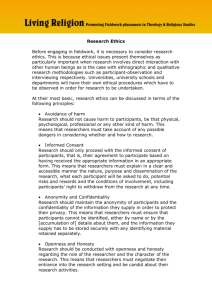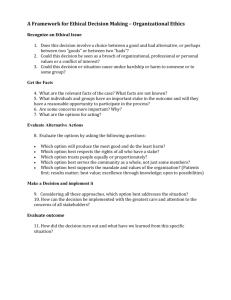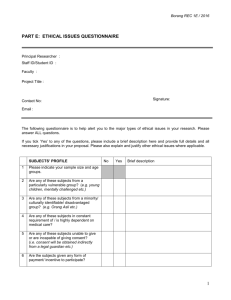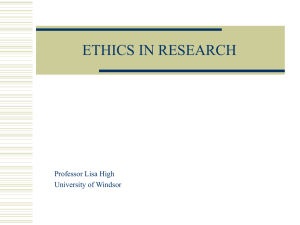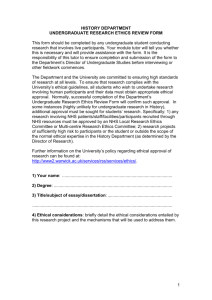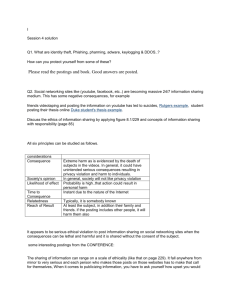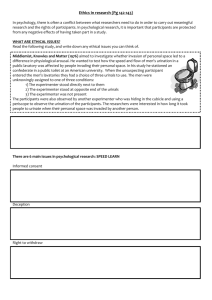Ethics and Ethical Practice in Social Science Research
advertisement
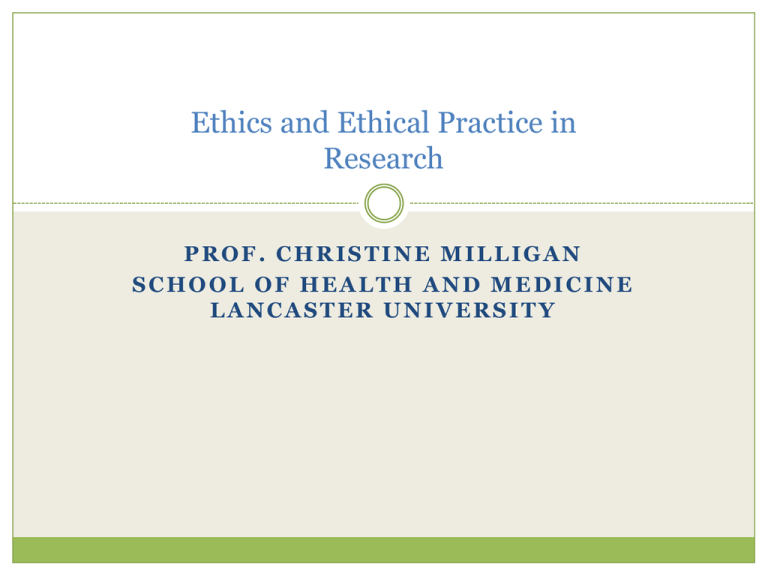
Ethics and Ethical Practice in Research PROF. CHRISTINE MILLIGAN SCHOOL OF HEALTH AND MEDICINE LANCASTER UNIVERSITY Key Terms Research Ethics: moral principles guiding research; Ethical Principles: concerned with rights, dignity & safety of researched; Research Governance: development of shared standards and mechanisms for monitoring/management of research (& sanctions if required). 6 key principles Research should be designed, reviewed and undertaken to ensure integrity and quality; Informed consent of both research staff and subjects; Confidentially of information and anonymity of respondents must be respected; Participation must be voluntary and free from coercion; Harm avoidance; Independence of research - any conflicts of interest or partiality must be explicit. Implementation Responsibility for conduct of research rests with the principal investigator (PI); Responsibility for gaining appropriate ethical review & monitoring lies with the institution employing the PI and researchers; Research involving primary data collection or use of organs/tissues etc. will ALWAYS raises some ethical issues; Use of secondary datasets is often uncontroversial BUT we cannot automatically assume so (e.g. novel use of existing databases or data linkage) Research Councils and their REFs: Breaches of good ethical practice can bring to bear both individual AND institutional level sanctions. Ethics in Practice Proposals need to demonstrate what ethical approval is required & how this will be achieved - in signing off a proposal an institution is indicating it concurs with this; All legal requirements must be met, e.g. data protection, health and safety, privacy laws, IPR etc. Data cannot be stored or transferred to a country outside the EU unless to country has equivalent levels of protection for personal data or UNLESS data stripping has occurred. Researcher needs to be alert to unanticipated ethical issues that arise in course of carrying out research; Expedited Review Where potential risk or harm to participants minimal, e.g. use of secondary datasets or published data in public domain; May also be needed where projects have short lead time or in response to demand of pressing importance; Often carried out by Chair or sub- group of REC or ‘virtual committee’. Informed Consent Information sheets; Content of signed consent forms; Who signs? (working with vulnerable groups) Staged consent? Anonymity & Confidentiality Anonymity (people and text) refers to concealing the identity of participants/places in all documents resulting from the research; Confidentiality is concerned with who has the right of access to the data provided by participants. Risk in Social Research Refers to the potential physical or psychological harm, discomfort or stress that might be generated by research. Wide range of methods used in research means there is a diverse range of potential risks that may need to be managed; Includes risk to a subject’s personal social standing, privacy, personal values and beliefs, links to family & wider community and position within an occupational (workrelated) setting; Potential for harm can also arise from revealing information related to illegal, sexual or deviant behaviour; Highlights importance of informed consent . Social Research incurring more than minimal risk Research involving vulnerable groups; Research involving sensitive topics; Research requiring access through gatekeepers; Covert research; Research involving access to confidential records or personal information; Research that could induce psychological stress, anxiety, humiliation or more than minimal pain; Research involving intrusive interventions. Ethics Resource http://www.lancs.ac.uk/researchethics/

